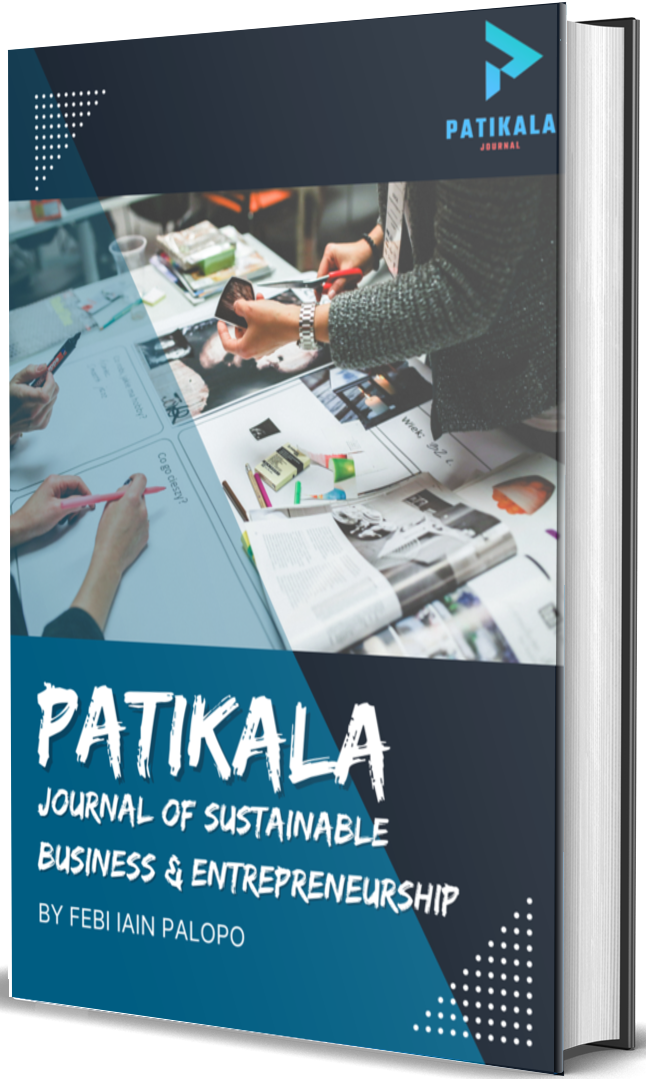Impact Analysis SME's Knowledge Towards E-Commerce Transaction On Islamic Business Ethics
Abstract
Purpose:This study discusses the influence of the level of understanding of MSME actors one-commerce transactions according to Islamic business ethics. this research aimstodetermine the effect of the level of understanding of SMEs on e-commerce transactionsaccording to Islamic business ethics.Design/methodology/approach:This research uses the quantitative method by designassociative ex-post facto which aims to determine the effect of the level of understanding ofMSME actors on e-commerce transactions according to Islamic business ethics. The totalpopulation is 167 MSME actors who carry out e-commerce transactions by taking samplesusing simple random sampling of 63 MSME. The research instrument used a questionnaire(questionnaire) and documentation. Furthermore, inferential analysis uses a simple linearregression equation using SPSS for Windows Version 20.Findings:Based on this study, there is an influence on the level of understanding of MSMEactors on Islamic business ethics in Palopo City.The results of this descriptive study indicatethat the understanding of MSME actors (X) affects e-commerce transactions (Y) where theTcount value is 3.925 greater than Ttable 2.002 and a significant value understanding ofMSME actors is 0.000 <0.05 (H0 is rejected and rejected H1 is accepted). So it can beinterpreted that the understanding of MSME actors influences e-commerce transactionsaccording to Islamic business ethics in Palopo City by 73.8%, the remaining 26.2% is obtainedby other factors not examined in this study.Originality:This research is based on the results of previous research regarding researchrelated to the Understanding of MSME Actors in E-Commerce Transactions in the study ofIslamic Business Ethics (Palopo City).Research limitations:The limitations of this research are interpreting, summarizing andexplaining, as well as differentiating and solving problems. The scope of the study was inPalopo City.Practical & Social Implications:The results of this research are theoretically expected to beable to contribute ideas in enriching the insights of MSME development for MSME actors sothey can optimize in developing their businesses by prioritizing ethical aspects in doingbusiness. In addition, it can be used as material for consideration in preparing researchreports related to the understanding of MSME actors in E-Commarce transactions in Islamicbusiness ethics studies.References
Barus, E. E. dan N. (2016). Implementasi Etika Bisnis Islam (Studi pada Rumah Makan Wong Solo Medan. Jurnal Perspektif Darussalama, Vol.2, No.
Cavanagh, G. F., Moberg, D. J., & Velasquez, M. (1995). Making Business Ethics Practical. Business Ethics Quarterly. https://doi.org/10.2307/3857391
Furley, P., Dörr, J., & Loffing, F. (2018). Goofy vs. Regular: Laterality effects in surfing. Laterality. https://doi.org/10.1080/1357650X.2018.1433192
Google Temasek Bain & Company. (2019). Swipe up and to the right: Southeast Asia’s $100 billion Internet economy. E-Conomy SEA Report.
Hania, B. T., & Fajaruddin, A. (2019). BUSINESS SYSTEM ANALYSIS BASED ON MULTI LEVEL MARKETING IN THE PERPSECTIVE OF ISLAMIC BUSINESS ETHICS (CASE STUDY: PT. VERITRA SENTOSA INTERNATIONAL). Journal of Islamic Economics and Philanthropy. https://doi.org/10.21111/jiep.v2i01.3098
Hayono, S. dan N. (2018). Efektifitas Penggunaan Media E-Commerce Terhadap Peningkatan Pendapatan UMKM Depok Dilihat Dari Etika Bisnis.
Helmalia. (2018). Pengaruh E-Commerce Terhadap Peningkatan Pendapatan Usaha Mikro Kecil dan Menengah Di Kota Padang. Jurnal Ekonomi Dan Bisnis Islam (Journal of Islamic Economics and Business), Vol.3, No.
Ikbal, M., Mustafa, S. W., & Bustami, L. (2018). PERAN USAHA MIKRO, KECIL DAN MENENGAH DALAM MENGURANGI PENGANGGURAN DI KOTA PALOPO. Jurnal Ekonomi Pembangunan STIE Muhammadiyah Palopo. https://doi.org/10.35906/jep01.v4i1.293
Irawan, H. (2017). Penerapan Etika Bisnis Islam Pada Pedagang Sembako di Pasar Sentral Sinjai. UIN Alauddin Makassa.
Laily, E. I. N. (2015). Partisipasi Masyarakat Dalam Perencanaan Pembangunan Partisipatif. Jurnal Kebijakan Dan Manajemen Publik, Vol. 3, No.
Mustofa, I. (2012). Transaksi Elektronik (E-Commerce) Dalam Perspektif Fikih. Jurnal Hukum Islam, 10(2), 157–180. http://e-journal.stain-pekalongan.ac.id/index.php/jhi%0Ahttp://moraref.or.id/record/view/38978
Partomo, T. S. dan A. R. S. (2022). Ekonomi Skala Kecil Menengah dan Koperasi. Ghalia Indonesia.
Prasetiyo, et al. (2018). E-Commerce, Menciptakan Daya Saing Melalui Teknologi Informasi. 4.
Pratiwi, I. D. (2019). STRATEGI PENINGKATAN DAYA SAING USAHA MIKRO MELALUI MARKETING ONLINE DALAM PERSPEKTIF EKONOMI ISLAM. In Progress in Retinal and Eye Research (Vol. 561, Issue 3).
Santoso, A. P. (2017). 2813100040-Undergraduate-Theses.
Sara, K. D. dan F. (2020). Peran Kewirausahan dan E-Commerce Terhadap Perkembangan Usaha, Mikro, Kecil dan Menengah (UMKM) Dalam Perspektif Islam. Jurnal EMA – Ekonomi Manajemen Akuntansi, Vol. 5, No.
Sholihah Hani. (2020). Islamic business ethics in the. Amwaluna.
Siskawati, N. (2020). Tinjauan Etika Bisnis Islam Terhadap Perilaku Produsen (Studi Kasus Pada Industri Rumah Tangga Thoreng (Lentho Goreng) di Desa Madusari Kecamatan Siman Kabupaten Ponorogo).
statista.com. (2018). • Number of internet users in Indonesia 2022 | Statista. In Statista.
Sugiyono. (2014). Metode Penelitian Kuantitatif, Kualitatif dan R&D (Cet. 20). Alfabeta.
Tambunan, T. (2012). Usaha Mikro kecil Menengah Di Indonesia. LP3ES.
Vovchenko, N. G., Andreeva, A. V., Orobinskiy, A. S., & Filippov, Y. M. (2017). Competitive Advantages of Financial Transactions on the Basis of the Blockchain Technology in Digital Economy. EUROPEAN RESEARCH STUDIES JOURNAL. https://doi.org/10.35808/ersj/778
Widana, G. O., Wiryono, S. K., Purwanegara, M. S., & Toha, M. (2015). Exploring the impact of islamic business ethics and relationship marketing orientation on business performance: The islamic banking experience. Asian Academy of Management Journal.
Wulandari, D., Utomo, S. H., & Narmaditya, B. S. (2020). The relationship between economic growth and macroeconomic indicators in Indonesia. Journal of International Studies. https://doi.org/10.14254/2071-8330.2020/13-2/10

